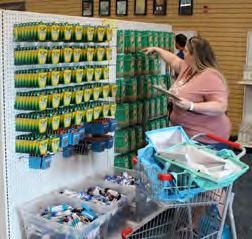
15 minute read
THE GIFT THAT KEEPS ON GIVING
Learn more about a few of the nonprofits making a difference in our Central Florida community.


A Gift for Teaching


If you can read this—thank a teacher. Most people can name at least one educator that has made a lasting impression on their lives, can you? Not only for imparting practical skills like reading, writing, and math but for instilling the confidence to discover your dreams and create the life you live today. It can feel extremely rewarding to have such a lifelong impact on future generations, but it can also be daunting and difficult to overcome the barriers teachers face to do so.
One of those hurdles is as small as a pencil. Orange County Public Schools is the ninth largest school district in the United States with 70% of schools considered high need. Tens of thousands of students are not able to afford lunch let alone school supplies, and that number has only multiplied after the flooding and destruction left by Hurricane Ian. Understanding that a child’s ability to learn and achieve becomes limited without access to essential supplies, our teachers spend upwards of $500 out of their own pockets every school year. This is where A Gift For Teaching supports educators as Central Florida’s primary provider of free supplies to teachers for their students who need them most.
For nearly 25 years, A Gift For Teaching has connected the community and businesses to the everevolving needs of public school teachers and students. With a mission to provide educational resources that empower teachers to inspire future leaders, A Gift For Teaching envisions a future where every student has the tools and experiences to succeed. Through its innovative distribution methods, more than $153 million in supplies have been provided directly to schools and classrooms since 1998 to foster student achievement, selfesteem, and interest in learning.
To help alleviate the financial burden of purchasing supplies, eligible teachers can shop in a retail store, online, and on a mobile unit the entire school year for free supplies that are generously donated and funded by the community. This includes pens, notebooks, books, backpacks, clothing, hygiene items, learning incentives, teaching tools, and more.
It is more than just a pencil. Even in a digital learning environment, pencils are needed to sleuth solutions, cultivate creativity, and take tests. But as we enter the second half of the school year, more than 75% of students will run out of supplies and their families will not be able to buy replacements. Replenishing supplies is vital to ensure local students have the tools they need to finish the year with success.
Education is truly a gift that keeps on giving, and you can be a part of this gift. For a limited time, through Dec. 31., donations to A Gift For Teaching will be eligible to be doubled and go twice as far with the help of generous matching funders. Every $1 received can be transformed into $20 worth of supplies that are placed into the hands of students to discover their dreams and craft their future. Visit AGiftForTeaching.org/ double for more information.





Canine Companions
As the leader of the service dog industry, Canine Companions enhances independence for children, adults, and veterans with disabilities through expertly trained service dogs. Established in 1975, Canine Companions is the largest nonprofit provider of service dogs in the United States. Here are a few facts about service dogs:
■ 61 million adults have a disability. ■ 4.7 million veterans have a service-related disability. ■ Canine Companions currently serves people with more than 65 different types of disabilities. ■ Canine Companions has more than 2,700 active teams throughout the country, and we have placed more than 7,300 teams since our founding in 1975. Our dogs require two years of training to do their job. ■ Service dogs are working dogs, not pets.
Canine Companions does not charge for service dogs or the lifetime of ongoing support they provide. They depend on private funding through donations from individuals, corporations, foundations, special events, and community organizations.
Imagine having a dog that knows more than 45 tasks and can turn on lights, pick up dropped keys, open a door, and even assist with business transactions by transferring money, receipts, and packages. They can also assist someone who is deaf or hard of hearing by alerting them to important sounds in their environment, and work with professionals in health care and education. Canine Companions also recognizes the need for programs that provide support to veterans with disabilities. Service dogs can assist veterans with a variety of physical, auditory, and trauma-related disabilities, as well as PTSD.
But it all starts with a puppy. Our service dogs aren’t just born, they are raised by volunteer puppy raisers. Canine Companions volunteer puppy raisers provide specially bred puppies a safe home, take them to obedience classes, serve up a healthy diet, provide socialization opportunities and give lots of love. Each hour spent caring for a Canine Companions puppy is vital to its development as a future service dog. The puppy raising program provides a unique opportunity for volunteers to assist with our important mission.
The Southeast Region of Canine Companions, an 8-acre campus located in Orlando, opened on Independence Day, July 4, 2000, and is a state-of-the-art facility where training, education and caring come together.
The demand for our highly trained service dogs is ongoing and growing and you can help.
Learn more at canine.org or call 1-800-572-BARK.

Building Homes and Transforming Lives in Central Florida
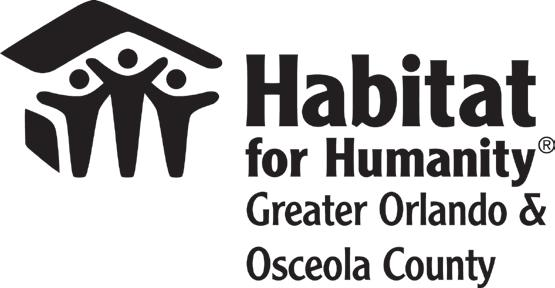
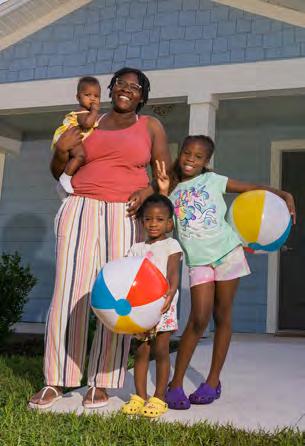

As Central Florida faces an affordable housing crisis, one local nonprofit is focused on providing safe, affordable homes for the community. Driven by a belief that everyone deserves a safe place to live, Habitat for Humanity Greater Orlando & Osceola County builds affordable housing, revitalizes neighborhoods, and strengthens communities. Over the last 36 years, Habitat Orlando & Osceola has built, rehabbed and repaired nearly 800 homes.
Families and individuals who partner with the nonprofit make a personal and financial investment in their future and maintain all the responsibilities that come with owning a home, including paying closing costs, mortgage, insurance and taxes.
“When people become homeowners, they gain so much more than a home,” says Habitat for Humanity Greater Orlando & Osceola County President & CEO Catherine Steck McManus. “Homeownership leads to improved financial and housing stability, and better health, educational, and early childhood development outcomes.”
Making Homeownership Affordable
Habitat Orlando & Osceola meets the critical need for safe, affordable housing and financial stability through donations and grants. Over 78,000 households in Orlando & Osceola County are low-income and pay more than 40% toward rent, according to Shimberg Center for Housing Studies.
Financial Education & Mentorship
Habitat Orlando & Osceola homebuyers must complete homeownership and financial education classes that provide a foundation for success as homeowners.
Additionally, the nonprofit’s financial mentoring program helps potential first-time homebuyers address financial challenges that are barriers to good credit and homeownership. They are also working toward becoming a HUD-certified housing counselor so they can magnify their impact.
Home Preservation
While Habitat Orlando & Osceola focuses on getting people safe, affordable homes, they are also invested in making sure families and the elderly can remain safe and sound in their own homes.
Through its roof replacement program, funded by Orange County, Habitat Orlando & Osceola helps local homeowners get new roofs at no charge. For most of these residents, this program is the only option to keep their home safe.
After Hurricane Ian devastated parts of Central Florida, Habitat Orlando & Osceola committed to helping the community rebuild and recover. They implemented a Cleanup Bucket Drive to collect essential cleaning supplies, safety gear and tarps for those affected.
Policy & Advocacy
Habitat Orlando & Osceola is taking a greater role in addressing the severe housing crisis in Central Florida. This includes understanding what it means for the health and equity of our community.
Habitat has recently added dedicated staff to focus on policy, innovation and strategic initiatives that have bolstered their research and analysis capacity. To truly address the problem, Habitat believes in pursuing collaborative innovation to face the housing crisis.
When you give, your donation does more than build a home — it’s an investment into our region. Homeownership creates jobs, revitalizes neighborhoods, attracts employers, increases consumer spending and government revenues, and lowers the risk of foreclosure, all while bringing transformative benefits to families. To donate to a cause that directly impacts the communities in which we live and work, visit www.HabitatOrlando.org.
Committed to Every Community Issue: Heart of Florida United Way Provides Relief Post Hurricane Ian



United Way has never been a single-issue organization. Rather than simply feeding a family, the nonprofit aims to ensure that the children are educated and their parents find steady employment, along, of course, with providing them fresh food and shelter. The organization recognizes that problems exacerbate further problems, often leaving the least fortunate to be the most vulnerable, especially in the face of unexpected tragedy. This is why United Way and its plethora of local branches analyze the needs of the community and the individuals within, working to solve them through a multifaceted approach.
Central Florida’s own Heart of Florida United Way addresses a number of our community’s most critical needs: health, education, basic needs and financial stability. It operates the 211 Emergency Hotline, which received over 112,000 calls in 2021 alone, and recently launched “988” as the new number for the Suicide Prevention Lifeline, making it easier than ever to reach out to professionals regarding the mental health of yourself or a loved one.
However, the organization also addresses the emerging needs and unexpected crises that Central Florida faces, such as COVID-19 and, most recently, the devastating effects of Hurricane Ian. Shortly after the storm hit, Heart of Florida United Way established the Hurricane Recovery Fund, which aims to provide each approved applicant with several hundred dollars in funds through gift cards for food and supplies. Within four hours, the organization had already received 1,000 applicants seeking help in recovering from the losses they endured during the storm. Clearly, this was something the community was in desperate need of.
However, a nonprofit on its own can only do so much, so HFUW began to rally community support for donations. Top organizational supporters included The DeVos Family Foundation, The Walt Disney Company and Lockheed-Martin, among many others. However, support from concerned individual members of the community was also vital, as demonstrated in the organization’s partnership with WESH 2 News for the “Day of Giving Hurricane Relief Telethon.” Ultimately, within the span of a single week, Heart of Florida United Way raised over $1.5 million for distribution to those whose lives were affected by the hurricane.
“I’m incredibly proud of the work being done by Heart of Florida United Way and the generosity of the Central Florida community as we strive to overcome the hardship caused by Hurricane Ian,” said Jeff Hayward, President and CEO of Heart of Florida United Way. “With the help of organizations and individuals across several counties, we’ve been able to make an impact in the lives of countless people searching for food, supplies and shelter in the wake of this natural disaster.”
To learn more about the work being done by Heart of Florida United Way and their wide variety of programs, visit their website at https:// www.hfuw.org/.

The Orange County Regional History Center: Where Solid History Meets Serious Fun




At the Orange County Regional History Center, you can roam across 14,000 years right in the heart of downtown Orlando. In one gallery, immerse yourself in the days when 12-foot-tall mammoths roamed Florida. In others, revisit such varied topics as the space race, citrus culture, Civil Rights history, the Black community, the coming of Disney, Orlando’s alternative rock music scene, and much more. There’s truly something for all ages and interests in the museum’s exhibits about the richly diverse folks who created Central Florida and have called it home.
Even the museum’s location is historic. Its distinguished home — the restored 1927 Orange County Courthouse — was designed by Murry S. King, Florida’s first registered architect. In its four floors of galleries, the award-winning museum hosts both permanent and special exhibitions from the Smithsonian Institution and other prestigious museums that bring America’s stories to Central Florida.
Year-round History Center programs for the whole family range from trivia nights to talks by experts to “Sensory Sundays,” in partnership with the Autism Society of Greater Orlando. Family programs combine cool educational content with handson activities — also a feature of the History Center’s summer camp program. Fun weekend brunches sport titles such as “Mermaids and Mimosas,” rounding out a wide variety of events that make the museum an ideal destination for affordable dates, family outings, and school field trips.
Each year brings fresh opportunities for new, exciting things to see and do, linked to special exhibitions. The latest, Figurehead: Music & Mayhem in Orlando’s Underground, focuses on Orlando’s rock scene in the 1980s and ’90s, a period when eye-catching, innovative concert posters plastered downtown windows and captured the energy and drive of the era.
Central Floridians can read about such exhibitions and other wideranging topics in the History Center’s magazine, Reflections from Central Florida, which also highlights the archival collections of the museum’s Brechner Research Center, a rich resource for researchers from students to scholars.
The History Center is an Affiliate of the Smithsonian, an honor achieved by only about 200 organizations across the nation, and is accredited by the American Association of Museums, the highest honor a museum can receive. It has become a national leader in collecting and preserving history as it happens by documenting events including the Pulse nightclub tragedy and Central Florida’s response to the COVID pandemic. “We work hard to be Central Florida’s premier history museum, and we’re grateful for the national awards those efforts have brought us,” says the History Center’s executive director, Pam Schwartz. “But we’re even more proud to have the support of our visitors and members. Donations, of any size, are crucial in fulfilling the History Center’s mission to serve as a gateway for community engagement, education, and inspiration.”
You can learn more about the Orange County Regional History Center at TheHistoryCenter.org or become a member to receive loads of great perks and to become a part of preserving local history.
Seniors First
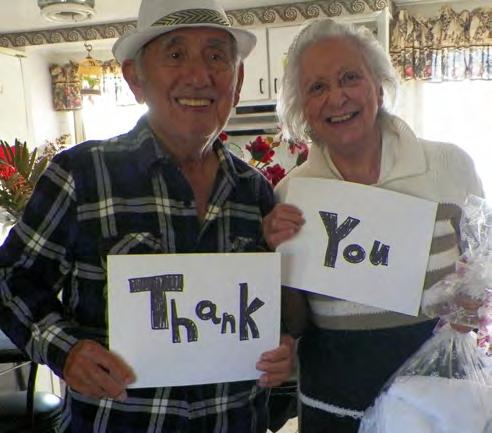
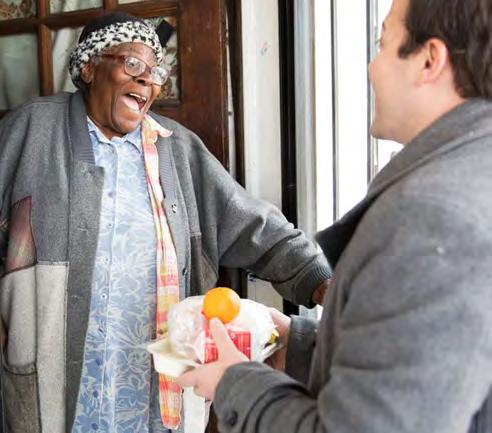
Seniors First has been serving the senior citizens of Central Florida for over 55 years with our mission to enhance the quality of life of seniors by maintaining their independence and dignity. All programs and services offer a vital support system to vulnerable older adults aged 60 and older that improve their quality of life, and delay/ avoid costly institutional care.
While some seniors are fortunate to have the support of family and friends or neighbors, many do not and find themselves struggling just to pay bills, often having to choose between nutritious food and medication. Currently 1 in 6 seniors struggle with hunger and may not know where their next meal will come from. That represents over 16,000 individuals in Orange County alone.
Overall, Seniors First served over 4,000 clients across all programs and services in 2021. To address senior hunger and nutrition, Seniors First served over 406,000 meals to seniors on our Meals on Wheels and Neighborhood Lunch Programs. The Neighborhood Lunch Program serves meals in a congregate setting. Both programs address the deeper and more widespread isolation and depression caused by the pandemic.
Additional Seniors First programs include a Community Food Pantry; In-Home Care that includes Personal Care Assistance, Homemaker, Companionship and Respite for Caregivers; Guardianship and Stepping Stone Medical Equipment Bank. Additional client support includes our
Pet Program providing food for clients’ pets and our Senior Loneliness Project providing counseling for those clients suffering from loneliness and depression.
The community can help our seniors in many ways by advocating, volunteering and donating.
Society tends to overlook the growing needs of this vulnerable demographic. By providing reliable, targeted nutrition and other in-home services Seniors First lessens the inevitable taxpayer burden. The cost to care for our community’s seniors at home is approximately $9,000 vs. $105,000 to care for them in a nursing home.
Advocating for increased support for communitybased programs is critical to meet seniors where they are and keep them thriving and independent in their own homes. Our client Anna said it best, “Your delicious meals and the care you provide has filled my life with friendship and joy. I don’t get out much anymore but because of your wonderful organization, the world comes to me, and I am not alone.”
Seniors First has several volunteer opportunities to get involved. This includes delivering Meals on Wheels, helping in our Community Food Pantry, joining one of our special event committees, heading a collection drive, or helping with administrative duties in the office.
To assist with the growing need to serve our community’s most vulnerable senior citizens more dollars are always needed. While we do receive funding from government sources, private foundations, corporations, the faith community and individuals, the need outpaces the funding. Seniors First has several ways to contribute whether it is monetary or in-kind.
To learn more about Seniors First programs and how you can get involved, please contact our offices at 407-2920177 or visit our website SeniorsFirstInc.org.










